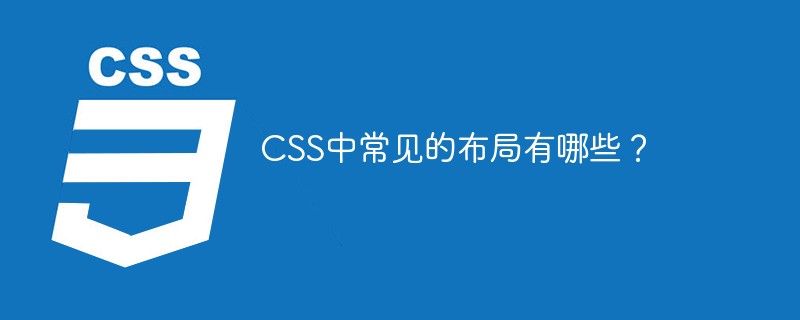Home >Web Front-end >Front-end Q&A >What are the common layouts in CSS?
What are the common layouts in CSS?
- 醉折花枝作酒筹Original
- 2021-07-23 11:26:335781browse
Common layouts in CSS are: 1. Horizontal centering, inline elements are horizontally centered, block-level elements are horizontally centered, and multiple block-level elements are horizontally centered; 2. Vertical centering, single-line inline elements are vertically centered and multiple Row elements are vertically centered; 3. Use flex layout; 4. Single-column layout; 5. Two-column layout.

The operating environment of this tutorial: Windows 7 system, CSS3&&HTML5 version, Dell G3 computer.
1. Horizontal centering:
Horizontal centering of inline elements
Use text-align: center to achieve inlining within block-level elements The element is centered horizontally. This method is effective for horizontal centering of inline elements (inline), inline blocks (inline-block), inline tables (inline-table), and inline-flex elements.
Core code:
.center-text {
text-align: center;
}Block-level elements are horizontally centered
By setting the margin-left and margin-right of fixed-width block-level elements to auto, you can make the block Level elements are centered horizontally.
Core code:
.center-block {
margin: 0 auto;
}Multiple block-level elements are horizontally centered
Use inline-block
If there are two or more blocks in a row Level element, by setting the display type of the block-level element to inline-block and the text-align attribute of the parent container, the multi-block-level elements can be horizontally centered.
Core code:
.container {
text-align: center;
}
.inline-block {
display: inline-block;
}2. Vertical centering
Single-line inline (inline-) elements are vertically centered
By setting Inline elements have height and line-height equal to each other, centering the element vertically.
Core code:
#v-box {
height: 120px;
line-height: 120px;
}Multi-line elements are vertically centered
Using table layout (table)
Using table layout's vertical-align: middle can be achieved Vertical centering of child elements.
Core code:
.center-table {
display: table;
}
.v-cell {
display: table-cell;
vertical-align: middle;
}3. Use flex layout (flex)
Use flex layout to achieve vertical centering, where flex-direction: column definition The main axis direction is longitudinal. Because flex layout is defined in CSS3, there are compatibility issues in older browsers.
Core code:
.center-flex {
display: flex;
flex-direction: column;
justify-content: center;
}4. Single column layout
There are two main types:
- header, content, footer width Same, there is a max-width
-the header and footer occupy 100% of the width of the browser, and the content has a max-width
The first one
<header style="background-color: red; width: 600px; margin: 0 auto;">头部</header> <main style="background-color: green; width: 600px; margin: 0 auto;">内容</main> <footer style="background-color: yellow; width: 600px; margin: 0 auto;">尾部</footer>
The second one :
<header style="background-color: red;">头部</header> <main style="background-color: green; width: 600px; margin: 0 auto;">内容</main> <footer style="background-color: yellow;">尾部</footer>
5. Two-column layout
float margin
Use float to pull the sidebar and the main content into one line, and then set the margin of the main content .
<main style="background-color: red;"> <aside style="background-color: yellow; float: left; width: 50px;">边栏</aside> <section style="background-color: green; margin-left: 50px;">主要内容</section> </main>
Recommended learning: css video tutorial
The above is the detailed content of What are the common layouts in CSS?. For more information, please follow other related articles on the PHP Chinese website!

